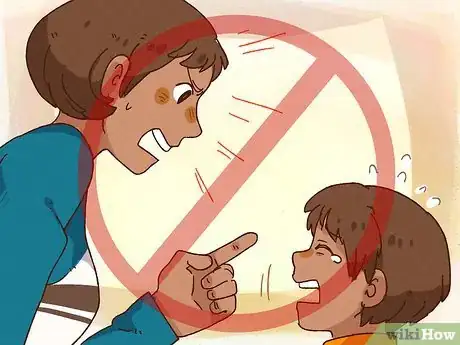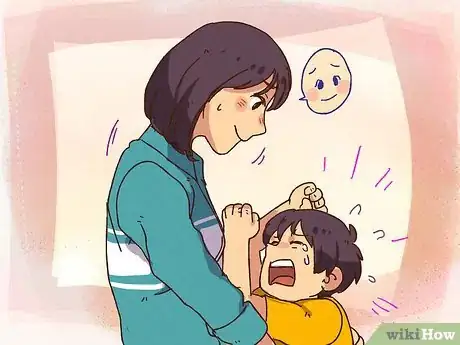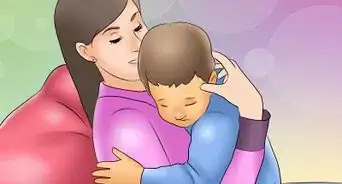This article was co-authored by Jami Yaeger. Jami Yaeger is a Parenting Specialist, Doula, and the Owner of AustinBorn, an online community offering comprehensive and modern education to growing families. With 10 years of experience, Jami specializes in whole family support for pregnancy, birth, postpartum, and parenting. Jami earned her BA in Theatre Performance from San Diego State University and earned her Certification as a Lactation Education Counselor from the University of California, San Diego. She is a Certified Infant and Child CPR Instructor, Birth and Postpartum Doula, and Childbirth Educator.
This article has been viewed 56,138 times.
Being a parent can be tough. If you have kids and want to learn how to better demonstrate and feel your love for them, you can learn how to change things up and make it easier on yourself. Learn to take little steps to love your kids, and be the best parent you can be.
Steps
Taking Little Steps
-
1Just be with your kids, don't "Parent" them. Lots of parents get intimidated by the role they have to assume. When you have a child, there's a big pressure to be a Parent with a capital "P." Instead of worrying about what that means, define the role for yourself. Being a parent doesn't mean you have to raise a perfect kid or be a perfect person. Just be yourself.[1]
- Instead of focusing on the burden of being a parent, focus on the opportunity. You get to hang out with strange little humans you created each day. You get to talk to a child seeing the world for the first time. You're lucky.
- Take a step away from your kids and take the time to observe them. Appreciate the moment that they’re having for themselves.
-
2Play with your kids. Get down in the dirt and talk to your kids about what they're doing, even if it looks like they're poking an acorn with a stick they've just drooled on. Learn to play Xbox. Keep up with all the weird TV shows they want to watch. Learn about what makes them tick.
- Just ask them questions about what they're doing while they're playing or pretending, or say, "What's that?" Get them talking. Be there for them, if they ask questions. Take your kids seriously.
- Use your play as a bargaining tool to get something done. Saying "I'll play with you for the next 15 minutes, and we can get your room cleaned up, okay?" works a lot better for everyone than yelling.
Advertisement -
3Talk to your kids every day. Studies reveal that children who are spoken to more while they're developing have a higher success rate and a track-record of happiness than kids who are spoken to less.[2] Point being, talk to your kids. Listen to your kids.
- Just talk, even if they're not speaking yet. You don't have to talk to them about little kid things, either. Tell them about what happened to you at work.[3]
- Listen to what they have to say, even if it doesn't make a whole lot of sense yet. Encourage your kids to speak when they have something they want to say.
- Ask your children about their passions and try to understand them or get interested in them. Find common things that you both can enjoy together.
-
4Wear them out. A kid who is quiet and tired is a kid that's easy to love. Kids who have had a busy day tend to be a lot more manageable. Good for everyone. So keep your kids busy with activities and things to do, instead of just plopping them down in front of the TV.
- Take your kids to the park regularly to let them play. It'll be an adventure for them, and you'll let them run out their energy.
- Ever heard the phrase "like a baby at the mall"? Any time you can do a quick sensory-overload experience, your kids will be tired out afterward. So, take them shopping. Take them to the store. It might be a stressful hour for you, but you can nab thirty minutes of nap-time later.
-
5Change their diet. Some people believe that diets heavy with processed food and artificial dyes can be tied to behavioral or attention issues. While there is no conclusive evidence proving that food actually causes conditions like ADHD, there are many reasons why cutting processed and refined sugars from your kids' diet, and increasing their intake of fresh fruits and vegetables, may be beneficial.[4]
- Sometimes, when kids are acting up, it's because their blood sugar is low. If your kids are acting up, give them a healthy snack. Snack time is an easy way to give your kids healthy food. Feed your kids some cut-up apple slices or a handful of nuts. Make ants-on-a-log. Something nutritious.
- Have meals together family-style. Make it a nightly routine to sit at the table altogether.
-
6Stop raising your voice. If you want your kids to quiet down, speak to them with a quieter tone of voice and make your home a quieter place. Being louder won't help anyone, but will make kids louder.[5]
-
7Have someone you can call any time you're feeling stressed. Sometimes, things can get pretty hard. You're trying to make dinner or get something important done, and your kids won't stop screaming or fighting with each other. Yikes. If you're at your breaking point, it's good to have someone to call and talk it out. This can be such a lifeline.
- Call a close friend or sibling who has kids to talk it out. There might not be any solution to things, but just talking to someone else can be a big relief. Tell them what your kids are doing that's annoying you. Just let it out.
- Keep a babysitter’s number close for when you need a break.
- Ultimate irony? Parenting never stops. Call your parent and talk it out if you're having trouble with the kids. Let them offer a willing ear.
Being a Good Parent
-
1Stop correcting your kids, unless it matters. Your job as a parent isn't to be an endless source of wisdom. Let them figure some things out on their own, and make their own mistakes. Let your kids scrape their knees.
- When your child is building with blocks, don't offer suggestions about making it stronger. Don't show them how to build a better tower. Support them and show an interest in what they're doing. Build your own statue, if you want to do it right.
- Try to give your kids the benefit of the doubt when it comes to advice. Their music will probably sound terrible to you. Their favorite movies will probably be insufferably bad. Like yours probably were to your parents.
- If your child is doing something dangerous, react calmly but firmly. Be honest with them about the consequences of dangerous actions.
-
2Be patient with your kids. Real talk: Kids can be a handful. You can still love your kids and parent them well and say that out loud. But learning to be patient with your kids and allow them to behave as kids will help you love them more. Expect that they will get on your nerves. Expect that they will act like kids. Things will go a lot more smoothly.
- Pick your battles and be the bigger person. Don't let your kids sucker you into getting irritated. Talk to them, or give them something else to do if they're getting on your nerves.
-
3Discipline your kids lovingly. Discipline needs to happen swiftly, calmly, firmly and consistently. Only discipline your kids when it's necessary and do it the same way each time.
- Take a step back any time you feel yourself getting extra-angry. If you feel like you might be disciplining your child because you're angry, or because you're frustrating with something else, just sit quietly for five or ten minutes. Talk to someone if you need to.
-
4Coach your kids when they find something they love. Encourage your kids to find passions and pursue those. Painting, basketball, football, soccer or whatever they like to do. Encourage them, and then learn everything you can about their passion and help them in their journey.
- Coach them in something they love, not something you love. Always wanted to be a world-class soccer player but never had the skills? If your kid is into it, great. If your kid wants to play guitar, don't force them into something else.
-
5Give your kids their own space and respect it. It's essential for each of your children to have something that they're responsible for, and something that they can call their own. If you can let each of your kids have their own bedrooms, it's an ideal situation. Let them make decorating decisions and take care of their own space.
- If you don't have room for each of your kids to have their own bedroom, it's still important for each of them to have their own space. Give your kids an area to call their own, or let them have a small pet that is their pet. Give your kids responsibilities.
- Respect your child’s privacy and the decisions they make. Trust in your parenting skills that you raised them to make the right choices.
Taking Time For Yourself
-
1Develop a routine to allow yourself a parenting break. Every parent needs a break in the action. It's very helpful to work some kind of break into your daily routine, to let yourself rest and relax from your parenting duties. It doesn't have to be elaborate or complicated.[6]
- Make a rule that any time your kids see your reading your favorite magazine, or picking up a book, they can't disturb you for fifteen minutes. Let them know that if they are, they can have a snack after.
- One word: Baths. If you've been taking care of kids all day, take 15 minutes for a soak at the end of it. Well-deserved.
-
2Do play dates. Strike up a deal with other parents to take your kids off your hands for a couple hours in the afternoon, and volunteer to the do the same at regular intervals. Giving yourself a break from parenting is essential to loving your kids and being able to spend time with them after being refreshed and rested.
- If your kids are older, or too old for playdates, give them some free time on their own. Let them explore the neighborhood. Give them some freedom.
-
3Hire a sitter regularly. A few hours away at night can be such a blessing. Make a point of regularly hiring a babysitter so you can give yourself the chance to go out and have some fun with your partner, or even by yourself. Give yourself a reminder of what life was like when you didn't have kids.
-
4Enlist help when you go out. If taking your kids into public is difficult, bring someone along to help. It can make it a lot easier on your, and a lot more fun to go out if you know you'll be able to spend time with a friend, loved one, or family member. If you dread a big shopping trip to the store with your kids, bring some back-up.
-
5Stop hovering. Sometimes, it can be more stressful than loving to be a parent. If you're constantly worried about your kids, working to make sure that they're successful, it might be better to loosen your grip a little. Take a step back and stop hovering. Let them live their own life and make mistakes. They'll be ok.
- A new parenting philosophy called "free-range kids" is popular in some areas. It involves giving kids more freedom than we traditionally think of as being appropriate. Would you let a child under ten ride the subway alone? Or skateboard in another part of town unaccompanied? Some people do. Teach your kids the essential safety rules they need, and trust them to behave smartly.
Expert Q&A
Did you know you can get expert answers for this article?
Unlock expert answers by supporting wikiHow
-
QuestionIs it normal to regret having a kid?
 Jami YaegerJami Yaeger is a Parenting Specialist, Doula, and the Owner of AustinBorn, an online community offering comprehensive and modern education to growing families. With 10 years of experience, Jami specializes in whole family support for pregnancy, birth, postpartum, and parenting. Jami earned her BA in Theatre Performance from San Diego State University and earned her Certification as a Lactation Education Counselor from the University of California, San Diego. She is a Certified Infant and Child CPR Instructor, Birth and Postpartum Doula, and Childbirth Educator.
Jami YaegerJami Yaeger is a Parenting Specialist, Doula, and the Owner of AustinBorn, an online community offering comprehensive and modern education to growing families. With 10 years of experience, Jami specializes in whole family support for pregnancy, birth, postpartum, and parenting. Jami earned her BA in Theatre Performance from San Diego State University and earned her Certification as a Lactation Education Counselor from the University of California, San Diego. She is a Certified Infant and Child CPR Instructor, Birth and Postpartum Doula, and Childbirth Educator.
Parenting Specialist Having a child is a major life event. You're going to go through all kinds of crazy emotions and feelings after your child is born, and postpartum depression can really mess with your headspace. Don't beat yourself up too much. Whatever you're feeling is valid, and your love for your child will grow.
Having a child is a major life event. You're going to go through all kinds of crazy emotions and feelings after your child is born, and postpartum depression can really mess with your headspace. Don't beat yourself up too much. Whatever you're feeling is valid, and your love for your child will grow.
Warnings
- Do not spoil your kids, as this will affect how they act when they are older.⧼thumbs_response⧽
References
- ↑ Jami Yaeger. Parenting Specialist. Expert Interview. 29 September 2020.
- ↑ https://www.psychologytoday.com/blog/momma-data/201304/the-power-talking-kids-the-talk-and-the-evidence
- ↑ Jami Yaeger. Parenting Specialist. Expert Interview. 29 September 2020.
- ↑ https://www.webmd.com/add-adhd/childhood-adhd/food-dye-adhd#1
- ↑ http://www.parenting.com/article/3-ways-to-get-kids-down-for-quiet-time
- ↑ Jami Yaeger. Parenting Specialist. Expert Interview. 29 September 2020.













































































